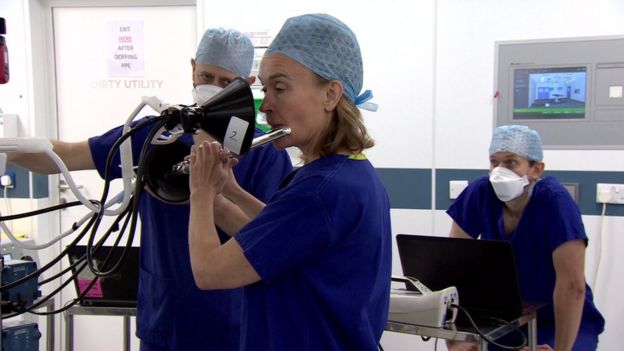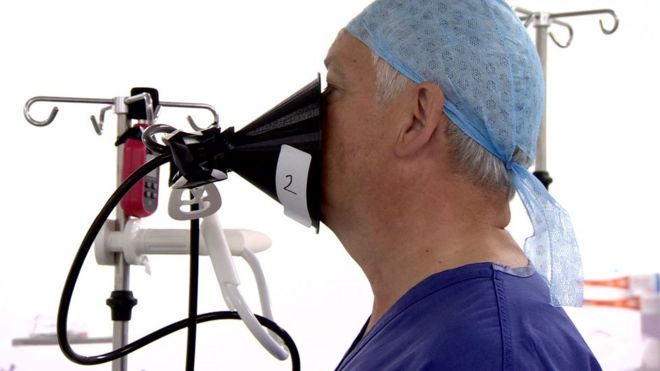Singing does not produce substantially more respiratory particles than speaking at a similar volume, a study suggests.
But it all depends on how loud a person is, according to the initial findings which are yet to be peer reviewed.
Study says singing is no riskier than talking for virus spread. Should congregations be allowed to sing at church without restrictions?https://t.co/4sDr82csbE
— Christian Concern (@CConcern) August 21, 2020
The project, called Perform, looked at the amount of aerosols and droplets generated by performers.
The findings could have implications for live indoor performances, which resumed in England this week.
They are currently only allowed to take place under strict social distancing guidelines.
Aerosols are tiny particles which are exhaled from the body and float in the air.
There is emerging evidence that coronavirus can be spread through these particles, as well in droplets which fall onto surfaces and are then touched.
Twenty-five professional performers of different genders, ethnicities, ages and backgrounds - musical theatre, opera, gospel, jazz and pop - took part in the study that was led by scientists at the University of Bristol.
They individually completed a range of exercises, which included singing and speaking Happy Birthday at different pitches and volumes, in an operating theatre where there were no other aerosols present.
This allowed researchers to analyse the aerosols produced by specific sounds.
They found that the volume of the voice had the largest impact on the amount of aerosol produced.
For example, there was some difference - albeit not very substantial - between speaking and singing at a similar level. Whereas singing or shouting at the loudest level could generate 30 times more aerosol.

Ventilation could also have an effect on how aerosol builds up. The larger the venue and the more ventilation there is could affect how concentrated the volumes are.
Jonathan Reid, professor of physical chemistry at the University of Bristol, is one of the authors of the paper, which was supported by Public Health England.
He said: "Our research has provided a rigorous scientific basis for Covid-19 recommendations for arts venues to operate safely, for both the performers and audience, by ensuring that spaces are appropriately ventilated to reduce the risk of airborne transmission."
Culture Secretary Oliver Dowden said: "I know singing is an important passion and pastime for many people, who I'm sure will join me in welcoming the findings of this important study.
"We have worked closely with medical experts throughout this crisis to develop our understanding of Covid-19, and we have now updated our guidance in light of these findings so people can get back to performing together safely."
Dr Rupert Beale of the Francis Crick Institute, said: "This important research suggests there is no specific excess risk of transmission due to singing.
Loud speech and singing both carry excess risk however. This research supports the possibility of safe performance as long as there's appropriate social distancing and ventilation."
Dr Julian Tang, honorary associate professor in respiratory sciences at the University of Leicester, said: "The risk is amplified when a group of singers are singing together, eg singing to an audience, whether in churches or concert halls or theatres.
It is a nice study but not exactly representative of the real whole choir dynamic, which really needs further study to truly assess the risk of such large volume synchronised singing vocalisations/exhalations.
"The risks should not be overly underestimated or played down because of this - we don't want choir members getting infected and potentially dying from Covid-19 whilst doing what they love."
Latest Stories
-
Dr. James Orleans-Lindsay to deliver keynote address at Africa Rising Symposium at LSE
8 minutes -
Cedi confidence and the cost of complacency: What the BoG Governor’s speech reveals
43 minutes -
Ga Mantse pledges support for Onesta Ghana’s Palm Oil expansion drive
52 minutes -
Today’s Front pages: Wednesday, July 16, 2025
1 hour -
2025 Ghana CEO Vision & Awards: Basil David Anthony nominated for CEO of the Year in Deco and Design
2 hours -
Government committed to honouring sacrifices of veterans – Defence Minister
2 hours -
Mahama’s fuel ban could deliver 81 maternity clinics, 121 schools and 303 CHPS compounds – Dr Khalid
2 hours -
Fuel allowance scrapped: Gov’t, on average, will save over GH¢121m in 4 years – Dr Sharif Khalid
3 hours -
Veterans deserve better – Defence Minister Omane Boamah calls for national support
3 hours -
Trump launches probe into Brazil’s ‘unfair’ trade practices
3 hours -
US inflation rises as tariffs drive up prices
3 hours -
Yemen postpones execution of Indian nurse on death row
3 hours -
World’s ‘oldest’ marathon runner dies at 114 in hit-and-run
4 hours -
Nigeria bids farewell to former leader Buhari with burial in home state
4 hours -
London Mayor leads historic trade mission to Ghana and Africa to deepen investment and cultural ties
4 hours

